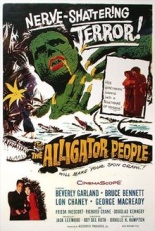
 If you’ve never seen an alligator in slacks before, you owe it to yourself to see The Alligator People. To be fair, this sci-fi schlocker technically should be titled The Alligator Person, but that’s hardly as marketable.
If you’ve never seen an alligator in slacks before, you owe it to yourself to see The Alligator People. To be fair, this sci-fi schlocker technically should be titled The Alligator Person, but that’s hardly as marketable.
In the needless wraparound story set at a sanitarium, two men hypnotize a woman (B-movie queen Beverly Garland, Not of This Earth) to tell the story she otherwise doesn’t remember: the one where she was newlywed nurse Joyce Webster, seated on a train heading to her honeymoon with hubby Paul (Richard Crane, TV’s Rocky Jones, Space Ranger). But one telegram and station stop later, Paul exits the choo-choo without explanation — not to mention consummation — and leaves his nonplussed bride behind!
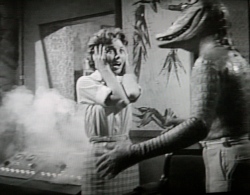 Sniffing for clues, Joyce hits pay dirt years later when she traces an old address of Paul’s to a stately plantation smack-dab in Louisiana swamp country. She’s invited to spend the night, provided she does not break the one
Sniffing for clues, Joyce hits pay dirt years later when she traces an old address of Paul’s to a stately plantation smack-dab in Louisiana swamp country. She’s invited to spend the night, provided she does not break the one red flag house rule: Do not leave the bedroom at night, no matter what. Joyce agrees, then totally leaves her bedroom at night, because she’s a nosy, horny woman and hears a piano playing. Unless this is your first film viewing ever, it spoils nothing to say that she finds Paul, his skin like cracked scabs, thanks to a science experiment entailing some 6 million volts.
Directed by Roy Del Ruth (Phantom of the Rue Morgue), this minor but merry flick bears echoes of the previous year’s mad-scientist classic The Fly, but lacks its lasting appeal. There’s still plenty to recommend, however, from Lon Chaney Jr. growling through a supporting role to Dick Smith’s alligator-man makeup effects. I want to rub my hand on them. —Rod Lott

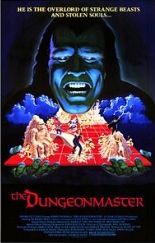
 Thus, Paul does battle with the following:
Thus, Paul does battle with the following: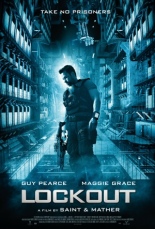
 Pearce is a great, charismatic actor, and it is one of the movie’s few pleasures that we finally get to watch him cut loose. He takes to the role with abandon, milking every corny one-liner and proving himself fully capable of acting the hero. If there’s a reason to watch, it’s to see him eclipse everyone and everything else onscreen. You keep wondering what it would be like to watch him in a good film, or at least a competent one.
Pearce is a great, charismatic actor, and it is one of the movie’s few pleasures that we finally get to watch him cut loose. He takes to the role with abandon, milking every corny one-liner and proving himself fully capable of acting the hero. If there’s a reason to watch, it’s to see him eclipse everyone and everything else onscreen. You keep wondering what it would be like to watch him in a good film, or at least a competent one.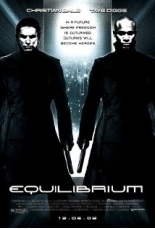
 But when Preston accidentally breaks his dose and can’t get another, he begins to question his ways, allegiance and life. Heck, he even begins to feel and sniff Emily Watson’s red ribbon when no one’s looking.
But when Preston accidentally breaks his dose and can’t get another, he begins to question his ways, allegiance and life. Heck, he even begins to feel and sniff Emily Watson’s red ribbon when no one’s looking.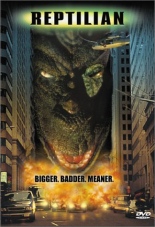
 The aliens are some of the cheapest-looking the decade produced (they speak English, yet their mouths never move), and Young Gary isn’t any better. Since he’s entirely a CGI creation, he’s entirely phony-looking the duration of the movie. Because director Hyung-rae Shim (
The aliens are some of the cheapest-looking the decade produced (they speak English, yet their mouths never move), and Young Gary isn’t any better. Since he’s entirely a CGI creation, he’s entirely phony-looking the duration of the movie. Because director Hyung-rae Shim (